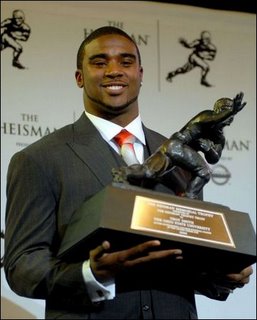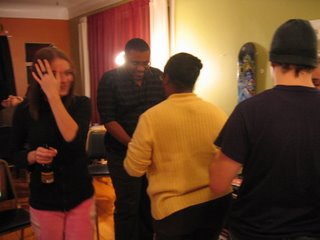***
 Yesterday C. and I went to see Dreamgirls, Bill Condon's film version of the Broadway musical show written by Henry Krieger and Tom Eyen. The movie received tremendous hype from the moment it was announced, and as I wrote in a prior blog entry, against my will I found myself succumbing (though I didn't drag C. to one of the $25 pre-release screenings). I want to echo many of the reviews and appraisals I've read online raving that the film was great and Oscar-worthy, but to tell the truth, I thought it was good-to=okay in almost all aspects, except one: the singing. But I'll get to that in a minute. The story, as anyone who has ever tangentially heard of Dreamgirls knows, is a fictionalized version of the Supremes' Motown story, with characters modeled on Diana Ross, Florence Ballard, Berry Gordy, and more broadly a metanarrative of late 20th century Black American popular music. Set primarily in Detroit and Hollywood, the Dreamgirls film explores the ugly public and personal sides of the music industry, as the most talented singer in a 1960s all-female R&B trio--first the Dreamettes, later the Dreams when they've "grown up"--robust, real Effie White (Jennifer Hudson), finds herself jettisoned for the more conventionally beautiful yet less vocally powerful or expressive Deena Jones (Beyoncé Knowles). A central theme in the story is the battle between authentic, soulful, vernacular Black music, which Effie's singing, like James "Thunder" Early's (Eddie Murphy, in his best dramatic performance ever), embodies, and "crossover" music, which is what propels the reconstituted Dreams and then Deena individually to stardom and, along with their ruthless manager, Curtis Taylor Jr. (Jamie Foxx), to tremendous wealth. Dreamgirls aims to dramatize this struggle, as well as related economic, social, and cultural struggles in condensed form, and succeeds to a point through its truncated plot and the actors' performances, but fails to do so with the very material medium embodying this deeper sociopolitical and aesthetic tension, the music. C. noted to me how many of the songs sounded like the parodies in Jennifer Lewis's hilarious film Jackie's Back, and I instantly agreed, which made me realize that even in the stage version, which I saw years ago, many of the songs were a liability in this regard, though it really struck me far more as I watched the film unfold.
Yesterday C. and I went to see Dreamgirls, Bill Condon's film version of the Broadway musical show written by Henry Krieger and Tom Eyen. The movie received tremendous hype from the moment it was announced, and as I wrote in a prior blog entry, against my will I found myself succumbing (though I didn't drag C. to one of the $25 pre-release screenings). I want to echo many of the reviews and appraisals I've read online raving that the film was great and Oscar-worthy, but to tell the truth, I thought it was good-to=okay in almost all aspects, except one: the singing. But I'll get to that in a minute. The story, as anyone who has ever tangentially heard of Dreamgirls knows, is a fictionalized version of the Supremes' Motown story, with characters modeled on Diana Ross, Florence Ballard, Berry Gordy, and more broadly a metanarrative of late 20th century Black American popular music. Set primarily in Detroit and Hollywood, the Dreamgirls film explores the ugly public and personal sides of the music industry, as the most talented singer in a 1960s all-female R&B trio--first the Dreamettes, later the Dreams when they've "grown up"--robust, real Effie White (Jennifer Hudson), finds herself jettisoned for the more conventionally beautiful yet less vocally powerful or expressive Deena Jones (Beyoncé Knowles). A central theme in the story is the battle between authentic, soulful, vernacular Black music, which Effie's singing, like James "Thunder" Early's (Eddie Murphy, in his best dramatic performance ever), embodies, and "crossover" music, which is what propels the reconstituted Dreams and then Deena individually to stardom and, along with their ruthless manager, Curtis Taylor Jr. (Jamie Foxx), to tremendous wealth. Dreamgirls aims to dramatize this struggle, as well as related economic, social, and cultural struggles in condensed form, and succeeds to a point through its truncated plot and the actors' performances, but fails to do so with the very material medium embodying this deeper sociopolitical and aesthetic tension, the music. C. noted to me how many of the songs sounded like the parodies in Jennifer Lewis's hilarious film Jackie's Back, and I instantly agreed, which made me realize that even in the stage version, which I saw years ago, many of the songs were a liability in this regard, though it really struck me far more as I watched the film unfold.There's little variation between the Dreamette's talent show song and almost every other one in the movie, which you could not say about the R&B of the early 1960s versus the Motown sound of the late 1960s or the extraordinarily rich variety of Black American music falling under the general rubrics of R&B, soul, funk, jazz, blues, rock, and pop from that period forward. Dreamgirls' chief musical exceptions mark the film's high points: Effie's two songs, "And I'm Telling You I'm Not Going" and "I'm Changing," which Jennifer Hudson TURNS INSIDE OUT. Her voice is, simply put, astonishing. Sista works! Her singing of the first song is one of the most thrilling musical performances I've witnessed on film in years, and the second demonstrates that she should have won American Idol (and any other singing contest she entered) zooming away. In fact, her singing made up for any quibbles I have with her as an actress (and I'm aware that she's a newcomer), and would be the main reason I'd watch the film again. Just to hear her voice was worth the price of the ticket, and--pace Jennifer Holliday!--I am going to buy the CD tracks just to listen to her again. One unfortunate aspect to her brilliant vocal moments is that the first exposes the dramatic fall-off in the script; after "And I'm Telling You I'm Not Going," the film lists forward towards its climax, and the mini-climax moments--which I won't reveal in case there's any Jstheater reader who's never seen the stage musical, hasn't seen the film, and doesn't know the plot--just don't really pack the punch they might.
But Dreamgirls does have other appealing elements. The first is Eddie Murphy, who not only sings well, but imbues his character with nuance and feeling beyond what the plot offers. Thunder's failure to fit in, to relinquish not just what he knows, but who he is and what gives life--and soul--to his music, is tragic, and Murphy takes us almost all the way. Beyoncé Knowles, who's been commodified five times over in her pop star career, shows that she can carry a role, and when allowed, that she can sing. For most of the film she buries her voice in her role as an ensemble singer, but in her pedestrian solo vehicle, "Listen," she sparkles. It's not a great song, but Beyoncé lets the world know she can sing. It goes without saying that the film also showcases how beautiful she is as well, and as the film enters the 1970s period, she starts to glow. Annika Noni Rose played the third member of the original trio, Lorrell Robinson, and she too showed she could hold her role and sing. When she, Beyoncé, and the replacement Dream, Sharon Leal, as Michelle Morris, harmonize, they elevate the songs they're singing, and when Hudson joins the mix, it nearly induces bliss. Maybe it was just me, but the whole time I watched Jamie Foxx and Danny Glover, I kept seeing Foxx and Glover as opposed to the characters they were inhabiting, which isn't to say that they weren't good, but I couldn't shed my sense of them as stars playing characters for most of their time on screen. In Foxx's case, I think the absence of any possibility of mimicry was the issue; in Ray, he became Ray Charles, whereas in this film, he was more transparently a star in character. He does sing as well as he did in the biopic, even though the songs offer less for his voice. Keith Robinson plays the fourth major male character, Effie's brother C.C., and he arrests mainly with his acting and his half-smile; of all the main performers he has the weakest voice.
Despite Robinson's comparatively weak voice, the film's strength lies in the singing, and to a lesser extent, in some of the performances. Murphy deserves an award of some sort for his canny turn, and if acting as it's traditionally understood is set aside and vocal performance can substitute for it, Hudson also deserves an award. I'm not sure about an Academy Award, but she deserves something--certainly a Grammy and other music awards are on the way. Beyoncé merits praise for embodying female glamor as it's rarely depicted these days onscreen. One treat is Loretta Divine's brief appearance (she sings!), and it got me thinking, why didn't the director try to find tiny roles for Sheryl Lee Ralph and Jennifer Holliday (if she'd have taken one) as well? That would have been a wonderful lagniappe. Nevertheless, though it doesn't live up to its prerelease hype or most of the rhapsodic reviews I've heard or come across on most accounts, the singing actually does.









 After
After 





 You thought the 2006 midterms were over, right? No, I know you're up on things, and you know that
You thought the 2006 midterms were over, right? No, I know you're up on things, and you know that  Last night, as I paused to break from my work work, I began to write a short fable about a young African-American Senator who once upon a time was a notably outspoken, progressive state legislator, and who, after dazzling viewers nationally with his stirring speech at the Democratic convention and winning election to the US Senate in spectacular landslide fashion, began moving quickly first to the center, and then to the right. Now, instead of addressing union halls and demanding a swift exit for our troops from Iraqmire, he's giggling with evangelicals and identifying faults among his fellow Democrats as he glides among rich potential backers and party hacks in an effort to prepare the ground for a possible presidential run.
Last night, as I paused to break from my work work, I began to write a short fable about a young African-American Senator who once upon a time was a notably outspoken, progressive state legislator, and who, after dazzling viewers nationally with his stirring speech at the Democratic convention and winning election to the US Senate in spectacular landslide fashion, began moving quickly first to the center, and then to the right. Now, instead of addressing union halls and demanding a swift exit for our troops from Iraqmire, he's giggling with evangelicals and identifying faults among his fellow Democrats as he glides among rich potential backers and party hacks in an effort to prepare the ground for a possible presidential run.
 My former student
My former student 




















 Two poems by
Two poems by